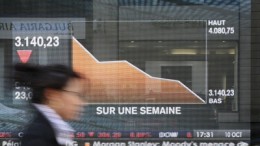Moody’s grades 17 German banks with negative outlook
Moody’s investors service said Thursday it had changed to negative the outlooks of 17 German banking groups and several subsidiaries. The decision affected their long-term debt and deposit ratings or their long-term guaranteed debt obligations, whose ratings incorporate support from the German government or several German federal states or municipalities. Moody’s explained the update of outlooks was the consequence of German sovereign and sub-sovereign ratings having been graded to negative from…





